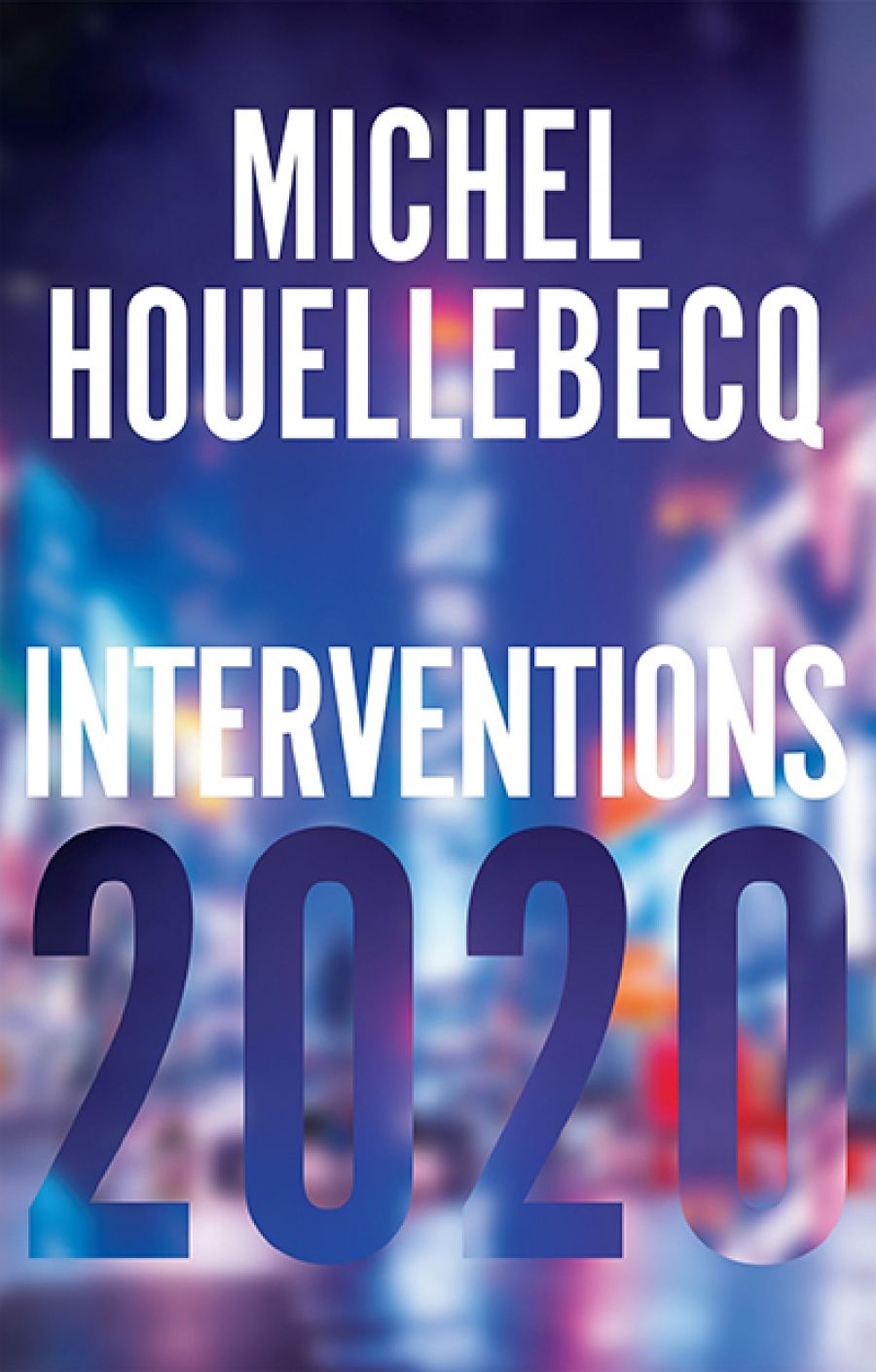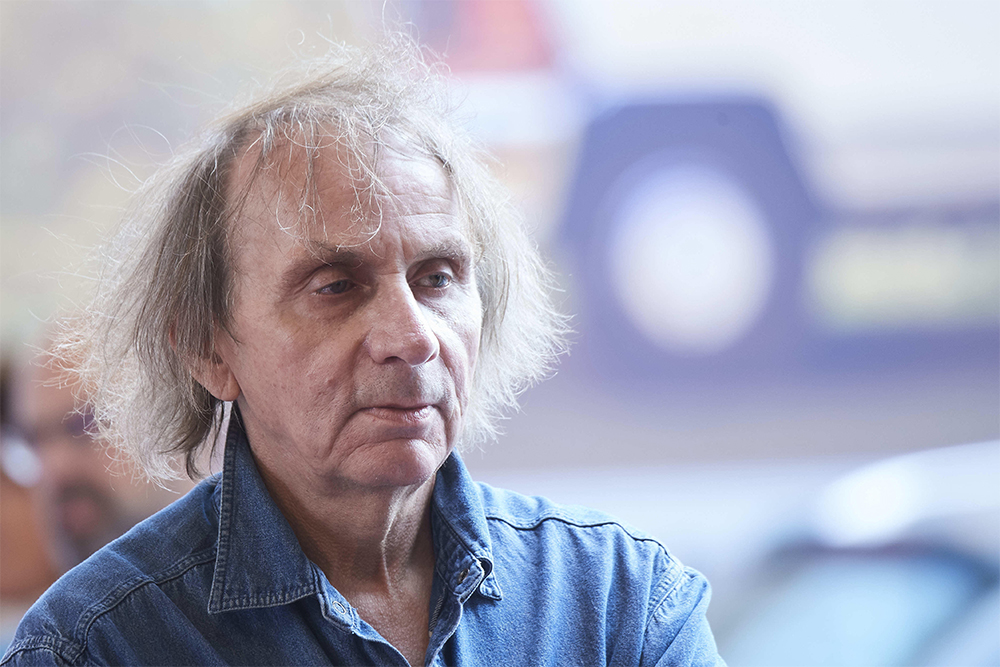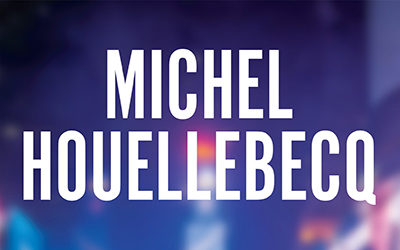
- Free Article: No
- Contents Category: French Studies
- Review Article: Yes
- Article Title: Nothing if not provocative
- Article Subtitle: The musings of Michel Houellebecq
- Online Only: Yes
- Custom Highlight Text:
Michel Houellebecq has never been one to hide his light under a bushel. Since the publication of his second and best-known novel, Atomised, in 1998 (the same year some of the pieces included in Interventions 2020 were originally published in French), Houellebecq has established himself as the enfant terrible of French letters, primarily through his provocative and at times incendiary remarks. Indeed, there is a certain expectation that Houellebecq will live up to his reputation, something he notes in his reflections on paedophilia: ‘Through the wording of your questions, I feel I am subtly being asked to say something politically incorrect.’ Rarely does he disappoint.
- Article Hero Image (920px wide):

- Article Hero Image Caption: Michel Houellebecq in 2019 in San Sebastian, Spain (photograph by Jack Abuin/ZUMA/Alamy)
- Alt Tag (Article Hero Image): Michel Houellebecq in 2019 in San Sebastian, Spain (photograph by Jack Abuin/ZUMA/Alamy)
- Featured Image (400px * 250px):

- Alt Tag (Featured Image): David Jack reviews ‘Interventions 2020’ by Michel Houellebecq, translated by Andrew Brown
- Book 1 Title: Interventions 2020
- Book 1 Biblio: Polity, £20 pb, 280 pp
- Book 1 Readings Link: booktopia.kh4ffx.net/YgYjjO
Interventions 2020 is a collection of occasional pieces, interviews, essays, musings, letters, and even a short opera. It spans some twenty-five years and covers Houellebecq’s thoughts on ‘big’ issues like feminism, Islam, the European Union (‘a bad idea; stupid, really’), Donald Trump (‘the best president America has ever had’), paedophiles (the ‘scapegoats’ of our society), the ‘sad fuck-up’ of contemporary art, the paradoxical survival of the book in the digital information age, and fame and literary awards. The volume also includes minor or personal reflections on subjects as varied as the poetry of Jacques Prévert (just so much ‘bullshit’ with its ‘optimism and faith in the future’), Neil Young (a ‘great artist’ who has ‘the courage to be sentimental’ and whose songs are tailor-made for losers who still believe happiness is possible), and how to survive parties (jettison any misconception that you will have fun or that the party will be anything but a failure; don’t be fooled by the ‘mistaken impression that others are having fun’; take a mild sedative before attending; and always keep in mind the ‘consoling perspective’ that with age ‘the obligation to go to parties decreases’). This list is far from exhaustive. Some of the pieces may lack context for an English-language readership: references to personages and events well known in the French cultural landscape may be obscure to those outside it. This is not a big deal in the age of the internet, but an edited collection may have served better in this instance. Nonetheless, Houellebecq always has something generally interesting to say on even the most particular topics.
How seriously one is meant to take Houellebecq’s claims is a matter of opinion. The author himself once lamented that no one really takes his ideas seriously, preferring to latch onto soundbites that, taken on their own, appear to justify the popular view of Houellebecq as a bigot, a racist, and a misogynist, among other things. It is easy to see how these labels have stuck. In the essay entitled ‘Humanity, the Second Stage’, for example, Houellebecq describes feminists as ‘amiable dimwits… made dangerous by their disarming lack of lucidity’. He is equally derisive of feminisms of equality and difference, and of what he calls Beauvoir’s ‘babble’ about woman as ‘social construct’ (for Houellebecq, the differences between the sexes are purely biological). Nonetheless, his critique of feminism is folded subtly into his critique of a patriarchal or masculine social system called capitalism. That feminism itself may be a product of this system as much as it is a reaction to it is an interesting, if debatable point. But Houellebecq goes a step further, siding with the radical feminist Valerie Solanas, who shot Andy Warhol in 1968. Solanas – author of SCUM Manifesto – was right because she argued not that women are equal to or different from men, but that they are superior. While he does not agree with her exhortations to violence, Houellebecq thinks Solanas on the whole got it right: men are nothing more than unhappy apes who have made of the world a ‘shitpile’ and for this reason ought to be quietly abolished.
Much of Interventions 2020 was written under the powerful influence of Arthur Schopenhauer, whom Houellebecq discovered at a young age. The governing notion of these essays, as with his poetry and fiction, is the ‘intuition that the universe is based on separation, suffering and evil’. Hence, too, the vaguely Buddhist solutions to the problems of late capitalism. We live, according to Houellebecq, in an age marked by distress. The world is a supermarket in which individual will has been replaced by collective desire, mediated through advertising, the moral force of our time. Everything in Houellebecq’s universe can be reduced to the logic of the supermarket: ‘advertising fails, depression spreads, distress increases’ – but advertising always finds a way. His answer to the problem of advertising-driven desire is to simply stop consuming, even for one day; to quite literally ‘step aside’. There is another way: pick up a book. Not just any book but what Houellebecq unambiguously calls literature. Literature, both its creation and consumption, constitutes for Houellebecq ‘the radical rejection of the world as it is’. In essence, Interventions 2020 is about writing and reading as acts of resistance, and of taking what in philosophical circles is called an ‘aesthetic attitude’ towards life: the attitude of radical disengagement. That said, books are a curious absence from Houellebecq’s personal utopia: a cave by the sea, where he lives ‘surrounded by friendly creatures’; a world in which there are no fleas, no money or work, no porn or religion; a suite of recreational drugs at his disposal. This vision nonetheless clearly indicates for Houellebecq the palliative role literature plays in our society; a role utopia makes wholly redundant.
The overall effect of reading Interventions 2020 is relief; relief that one doesn’t have to enjoy oneself, that one doesn’t really even have to ‘participate’, and that, in the words of Louis-Ferdinand Céline, one can sit quietly and wait for death, albeit with a certain uneasy apprehension. Regardless of what you think of Houellebecq’s views, he is ‘a clear and lucid intellect’, as he once said of his literary idol H.P. Lovecraft. He is also a great humourist, although however funny Houellebecq’s insights are, they always return us to the paradox of laughter in what T.W. Adorno famously called the ‘damaged society’: there is laughter where there is nothing to laugh about.


Comments powered by CComment